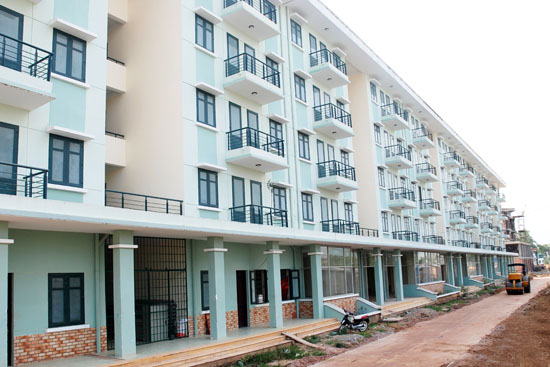The Law on Fees and Charges, promulgated on November 25, 2015, has ensured synchronization and consistency with the taxation and state budget legal system, therein fully and promptly reflecting revenue from fees and charges into the state budget, ensuring transparency in the management and use of revenue from fees and charges. The article analyzes several legal issues to assert that the Law on Fees and Charges of 2015 has established a stable and relatively comprehensive legal framework, creating a unified and stable revenue source for the state budget.
Current Legal Status on Fees and Charges in Vietnam
The Law on Fees and Charges 2015 is recognized for having many advantageous points and has established a legal framework ensuring a stable revenue source for the state budget (NSNN):
First, the law clarifies the nature of fees and charges.
According to Clause 1, Article 3, the Law on Fees and Charges stipulates, “Fee is the amount of money that organizations and individuals must pay to basically cover costs and services provided by a state agency, public service provider, and organizations authorized by a competent state agency to provide public services as specified in the List of Fees issued together with this Law.”
Thus, essentially, a fee is an amount of money that organizations and individuals must pay when they receive services from the state (directly or authorized to other organizations). This service is provided through the state offering various types of services.
Entities in society who enjoy these services have the obligation to pay a certain amount of money, which constitutes the fee. Fundamentally, the amount collected by the state (fee) is aimed at covering the costs incurred by the state in providing that service (non-profit oriented).
According to Clause 2, Article 3, the Law on Fees and Charges states, “Charge is a fixed amount that organizations and individuals must pay when provided with public services by a state agency, serving state management activities as specified in the List of Charges issued together with this Law.”
Therefore, a charge by nature is a fixed amount that must be paid to the state when organizations and individuals use services provided by the state.
The services provided by the state in this case are public services or services to facilitate state management over society. The collection of an amount of money from providing public services to serve state management activities is not intended to cover costs.
Second, the principles for determining the fee and charge amounts involve covering costs to attract economic components, thereby encouraging private investment in public services.
Establishing and prescribing principles for determining fee and charge amounts are important for creating a legal basis for implementing fee and charge policies in the future, particularly considering cost recovery. To establish a legal basis for collecting fees and charges, the Law on Fees and Charges sets forth principles for determining fee and charge amounts.
Articles 8 and 9 state: “The fee amount is primarily determined to ensure cost recovery, considering the state’s socioeconomic development policies in each period, ensuring fairness, transparency, and equality in the rights and obligations of citizens”; “The charge amount is fixed, not aimed at cost recovery; the registration fee is calculated as a percentage of the asset value; ensuring fairness, transparency, and equality in the rights and obligations of citizens.”
Specifying principles for determining fees and charges as above is reasonable because, essentially, collecting fees and charges is not profit-oriented, not aimed at increasing revenue for NSNN, but the collection must ensure economic efficiency.
Third, the clear regulation on the management and use of fees and charges ensures consistency with the 2015 Law on State Budget (NSNN).
Regulations on the scope of the budget, at Points a, b, Clause 1, Article 5 of the 2015 NSNN Law states: “NSNN revenue includes: All revenue from taxes, charges; All fees collected from service activities conducted by state agencies, if operational expenses are covered, then deductibles are made; fees collected from service activities performed by public service providers and state enterprises, paid to NSNN according to legal regulations.”
To ensure consistency and uniformity between the Law on Fees and Charges and the NSNN Law, Articles 11 and 12 of the Law on Fees and Charges clearly stipulate: “Fees and charges according to this Law are revenue sources for NSNN”; “Fees collected from services performed by state agencies must be paid to NSNN, if the state agency’s operational expenses are covered from the fee revenue, then deductibles can be made, the remainder is paid to NSNN. Fees collected from services performed by public service providers can be retained in part or whole to cover service provision costs based on budget estimation approved by a competent state agency, the remainder is paid to NSNN.”
Under these provisions, all revenue from fees and charges collected by fee-collecting organizations is identified as NSNN revenue, reflected centrally in NSNN. The amount that fee-collecting organizations retain is the fee revenue deducted from the total fee collected. Such regulations overcome previous limitations in the legal system on fees and charges.
Moreover, it contributes to rectifying the dispersion of public resources, enhancing the autonomy and responsibility of state agencies and public service providers in managing and effectively using fee and charge revenues.
Fourth, decentralizing fees and charges to local authorities.
Decentralizing fees and charges to local authorities is exceedingly important as it allows localities to balance their revenue sources, be proactive in revenues and expenditures for the locality, and maximize local revenue sources to avoid reliance on central government, thereby preventing the omission of local fee and charge revenues.
Thus, decentralizing fees and charges to local authorities aligns not only with the budget law system but also with current international practices.
The Law on Fees and Charges has delegated additional authority to local governments regarding the exemption and reduction of fees and charges. According to Clause 1, Article 21 of the Law on Fees and Charges: “The provincial-level People’s Council decides on the amount of collection, exemption, reduction…”
This provision aligns with international practices and empowers local authorities to implement the policies of the Communist Party and the state on social security suited to local realities. Additionally, it aids local authorities in thoroughly collecting fee and charge revenues, enabling them to balance revenue and expenditure tasks proactively.
Solutions to Enhance the Effectiveness of Implementing the Law on Fees and Charges
To integrate the Law on Fees and Charges 2015 into practice, the following measures should be deployed:
First, continue reviewing and issuing normative legal documents in the field of fees and charges but ensure that fees and charges are only collected as specified in the fee and charge list.
The fee and charge list issued together with the Law on Fees and Charges includes 213 fees and 103 charges, established so that the state only collects fees and charges for public services directly related to state management activities and services involving national sovereignty and natural resources. Fees related to services performed by state agencies and public service providers, such as health epidemic prevention fees, license assessment fees, must still be collected.
Removing certain fees and charges from the list is in line with current trends, as it will reduce administrative procedures, enabling people, businesses, and other social entities to easily access and use public services.
Thus, when issuing guidelines for fee collection and fee amounts, state agencies must base their actions on and can only collect fees and charges specified in the fee and charge list.
State agencies are only allowed to collect fees and charges when there is a regulation on the collection amount, if fees and charges outside the list are arbitrarily set and collected, then “depending on the nature and extent, disciplinary action, administrative sanctions, or criminal prosecution may be applied according to the law” (Clause 2, Article 16 of the Law on Fees and Charges).
Second, handle violations regarding the use and management of fees and charges according to the law.
The Law on Fees and Charges clearly defines the use and management of fees and charges. This regulation aims to reduce the dispersion of NSNN revenues.
Furthermore, it helps fee-collecting organizations increase their income, improve job quality, and also helps these organizations to purchase and equip facilities for fee collection, thereby promoting the “autonomous and accountable mechanism” in public administration, gradually modernizing state management, and saving costs for NSNN.
To achieve this goal, during the implementation of the Law on Fees and Charges, state agencies must comply conformity, and the collected fee and charge revenue must be deposited into an account at the state treasury and settled accordingly.
The amount deducted and retained (essentially the cost necessary for providing public services) from the total fee and charge revenue should be used according to the law (Articles 3, 4, 5 of Decree No. 120/2016/ND-CP dated August 23, 2016, by the Government of Vietnam detailing and guiding the implementation of certain provisions of the Law on Fees and Charges).
Non-compliance or improper compliance with these regulations is considered unlawful behavior. Depending on the nature and extent, such behavior may lead to disciplinary actions, administrative fines, or criminal prosecution according to law (Clause 2, Article 16 of the Law on Fees and Charges).
Third, implement according to the spirit of the transitional provisions.
Article 19 of the 2001 Ordinance on Fees and Charges stipulates clearly: “In cases of authorized collection, the organization authorized to collect the charge is allowed to retain part of the collected charge to cover the cost of collecting the charge, and the remainder must be paid to the NSNN.”
However, according to Clause 1, Article 13, the Law on Fees and Charges stipulates: “Fee-collecting organizations must fully and promptly pay the collected fees to the NSNN.” This regulation significantly affects these organizations since the cost to cover the charge collection may not be promptly arranged in the budget estimation.
To address this issue, a transitional provision is made at Article 24 of the Law on Fees and Charges and Clause 1, Article 7 of Decree No. 120/2016/ND-CP stating: “Fee and charge collecting organizations finalize the revenue from fees and charges for 2016 according to the provisions of the Ordinance on Fees and Charges and the tax management law. After finalization, the unspent retained fee and charge amount can be carried forward to the following year for continued expenditure according to policies until January 1, 2018, the remaining charge must be fully paid into the NSNN.”
Clearly, this is a reasonable provision, assisting organizations authorized to collect fees and charges to not face difficulties in covering costs when there hasn’t yet been an allocation in the budget estimation.
Thus, to achieve this goal, during implementation, agencies and organizations must follow the law's regulations. After the stipulated period, all fee and charge revenue must be paid into the NSNN. The expenditure for fee collection will be arranged in the annual budget estimation.
The 2015 Law on Fees and Charges was enacted to overcome previous limitations. Besides clearly defining the nature of fees and charges, the Law on Fees and Charges establishes principles for cost recovery; management and utilization of fee and charge revenues; enhancing decentralization to local authorities.
However, to create a strong legal corridor and stable revenue source for NSNN, the aforementioned solutions need to be implemented synchronously and decisively, along with legal propaganda and dissemination.
M. A. DINH VAN LINH - BANKING ACADEMY
Source: Financial Magazine
 Article table of contents
Article table of contents





.Medium.png)
.Medium.png)
.Medium.png)
.Medium.png)
